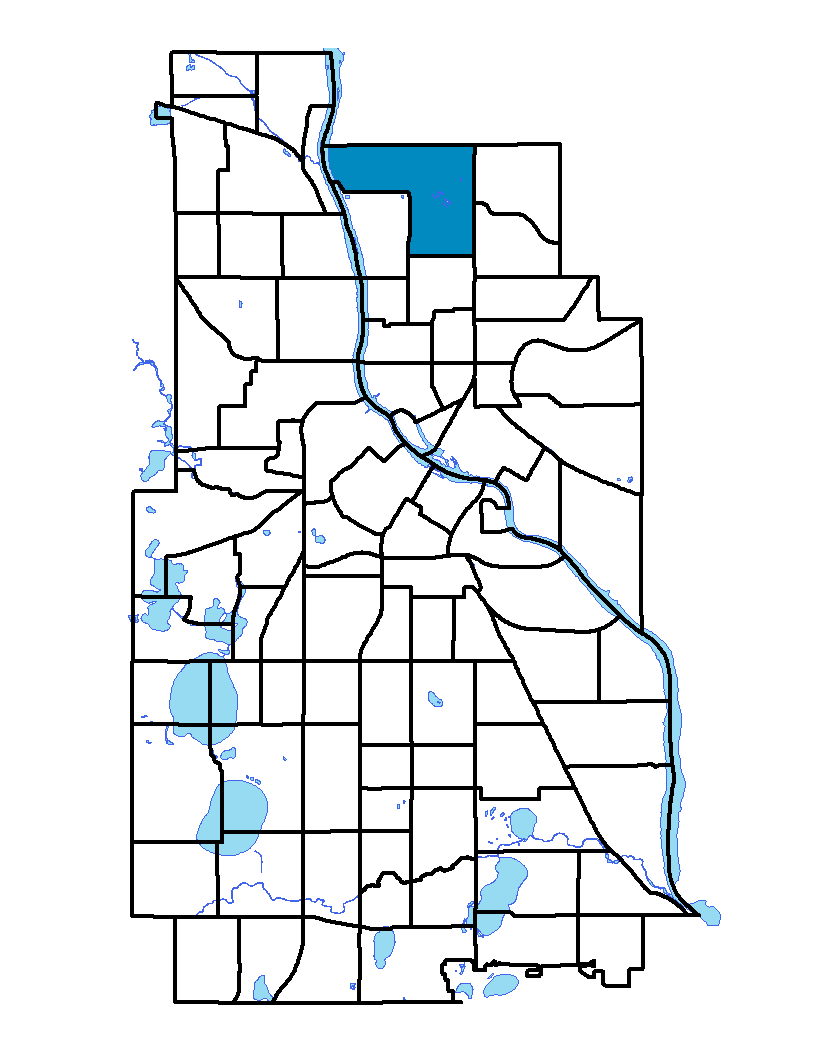The Cleveland neighborhood is located in northwest Minneapolis. It extends from Dowling Avenue North to Lowry Avenue in the south and from Penn Avenue in the east to Xerxes Avenue – the border between the City of Minneapolis and the City of Robbinsdale – to the west. The neighborhood is named after Grover Cleveland, born in 1837 and twice president of the United States. Cleveland is mainly a single-family detached housing residential neighborhood with a commercial area at the corner of Penn and Lowry avenues. Cleveland Park is located next to Lucy Craft Laney Middle School.
To learn more about the neighborhood association visit: www.clevelandneighborhood.org
Indicator Details
|
Indicators |
Primary Domain | Indicator Value | Rank | Tier |
|---|---|---|---|---|
| Access to Mainstream Financial Services | Economic Health | 31.8% | 60 | Bottom |
| Access to Parks and Open Space | Natural Areas | 2.0% | 68 | Bottom |
| Adult Educational Attainment | Educational Opportunities | 92.3% | 37 | Middle |
| Age of Housing | Housing | 95.9% | 78 | Bottom |
| Blood Lead Levels in Children | Housing | 4.2% | 43 | Middle |
| Business Retention | Economic Health | 1.3% | 45 | Middle |
| Chronic School Absence | Health Systems and Public Safety | 55.1% | 33 | Middle |
| Commute Mode Share | Transportation | 20.4% | 67 | Bottom |
| Employment Rate | Employment Opportunities | 67.1% | 52 | Middle |
| Excessive Housing Cost Burden | Housing | 28.0% | 42 | Middle |
| Food Desert | Neighborhood Characteristics | 100.0% | 31 | Middle |
| High School Graduation Rate | Educational Opportunities | -% | - | Data N/A |
| Household Transportation Costs | Transportation | 18.9% | 70 | Bottom |
| Local Business Vitality | Economic Health | 51.4% | 55 | Middle |
| Long-Term Unemployment | Employment Opportunities | 5.2% | 37 | Middle |
| Low Birth Weight | Health Systems and Public Safety | 9.4% | 56 | Middle |
| Motor Vehicle Collisions | Health Systems and Public Safety | 4.7 | 38 | Middle |
| Offsite Alcohol Outlets | Neighborhood Characteristics | 1 | 6 | Top |
| Pedestrian Connectivity | Transportation | 132.5 | 42 | Middle |
| Preschool Enrollment | Educational Opportunities | 51.4% | 41 | Middle |
| Preventable Hospitalizations | Health Systems and Public Safety | 19.8 | 85 | Bottom |
| Proximity to Brownfield Sites | Environmental Hazards | 0.0% | 1 | Top |
| Proximity to Superfund Sites | Environmental Hazards | 0.0% | 1 | Top |
| Public Assisted Households | Employment Opportunities | 27.9% | 57 | Middle |
| Reading Proficiency | Educational Opportunities | 11.1% | 30 | Middle |
| Residential Mobility | Social Cohesion | 73.7% | 60 | Bottom |
| Residential Proximity to Traffic | Environmental Hazards | 0.0% | 1 | Top |
| School Proximity to Traffic | Environmental Hazards | 0.0% | 1 | Top |
| School Readiness Scores | Educational Opportunities | -% | - | Data N/A |
| Toxic Releases from Facilities | Environmental Hazards | 0.0% | 1 | Top |
| Transit Accessibility | Transportation | 119.8 | 86 | Bottom |
| Travel Time to Work | Employment Opportunities | 21.8 minutes | 36 | Middle |
| Tree Cover | Natural Areas | 24.5% | 79 | Bottom |
| Vacancy Rates | Housing | 11.8% | 68 | Bottom |
| Violent Crime | Health Systems and Public Safety | 60.5 | 56 | Middle |
| Voter Participation | Social Cohesion | 19.6% | 61 | Bottom |
| Walkability | Neighborhood Characteristics | 42 | 73 | Bottom |

